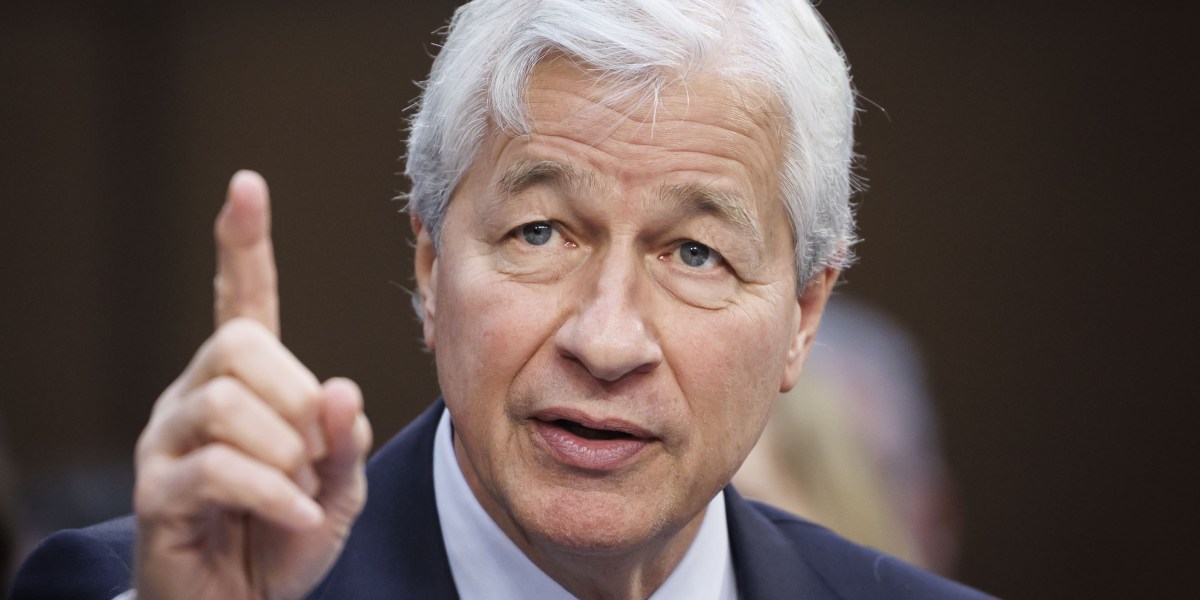In a CNBC interview from Davos, a visibly amused Dimon declared he was swearing off opining about the crypto currency. When asked about the new Bitcoin ETF the Securities and Exchange Commission approved last week, Dimon interrupted CNBC host Andrew Ross Sorkin, also of The New York Times, to say:
“So this is an important thing, this is the last time I’m ever going to talk about this on CNBC—so help me God,” Dimon said to laughs from studio hosts Sorkin, Joe Kernen, and Becky Quick.
That sort of exasperation has become a Dimon staple when discussing Bitcoin. He’s been saying he’ll never talk about Bitcoin again since as far back as 2017.
Dimon continued his criticism of Bitcoin, saying “it does nothing.”
“I call it the pet rock,” he said.
Dimon then corrected himself to say he did think Bitcoin did actually have some uses. They just all happened to be illegal such as money laundering, fraud, tax avoidance, or as payment for sex trafficking, he said.
There is evidence to support Dimon’s claim. The Government Accountability Office found that 15 of the 27 online commercial sex websites it examined in a June 2021 report accepted digital currencies. While the U.N. issued warnings that cryptocurrency platforms are often used for money laundering by criminal groups in Southeast Asia.
Despite these concerns, the market for cryptocurrencies has been exceptionally strong in recent years after a near-death experience during 2022’s “crypto winter.” In 2023, the market capitalization for the entire crypto industry grew 95%, although it’s still down 35% from its all-time high during the pandemic. Also, the SEC’s recent ETF approval is a signal that crypto is becoming a legitimate financial asset. And despite Dimon’s objections to owning cryptocurrency himself, many retail investors do. A study from 2022 found that 36% of millennials and 20% of total adults own cryptocurrencies.
Dimon’s history of Bitcoin talk
Over the years, Dimon has been open about his dislike for cryptocurrencies, calling people who invest in Bitcoin “stupid,” and once threatening to fire any employee caught investing in it. Meanwhile, he called the asset itself a “hyped-up fraud” and a “waste of time.” At a Senate hearing in December, Dimon said if it were up to him he’d “close it down,” earning a surprised reaction from crypto hawk Sen. Elizabeth Warren (D-Mass.)
Other major financial firms like BlackRock and Goldman Sachs had similar positions before changing their minds as crypto became more popular and lucrative. In 2020, Goldman Sachs published an analyst note explaining why it didn’t consider Bitcoin an asset class that was widely shared in both Wall Street and crypto circles. And while its investment chief is still wary of Bitcoin, CEO David Solomon signaled Goldman Sachs would be interested in acquiring bargain crypto companies.
When CNBC asked Dimon about companies that offer crypto products to their clients, he replied with the same dismissiveness he reserved for the asset itself.
“Number one I don’t care,” he told Sorkin. “So just please stop talking about this shit.”
BlackRock CEO Larry Fink was once in Dimon’s camp as a staunch Bitcoin critic, concerned it had limited use beyond criminal activity. In 2017, Fink famously called Bitcoin the “index of money laundering” and that the only it was good for was illustrating how much demand there was for that specific financial crime. Fink would eventually change his tune, though. By 2020, he believed it could grow into a global market. Fast forward to this month, when Bitcoin got the stamp of approval to become a spot ETF and BlackRock, the largest asset manager in the world, owns the third most Bitcoins of any public company.
Fellow asset manager Fidelity was early to embrace Bitcoin. It began mining the cryptocurrency in 2014, before launching its first trading platform in 2018. While BlackRock’s other competitors, State Street and Vanguard, the world’s second and third largest asset managers respectively, have opted to stay away from Bitcoin altogether.
“The investment case for cryptocurrencies is weak,” Vanguard told Bloomberg in December. “Unlike stocks and bonds, most crypto assets lack intrinsic economic value and generate no cash flows.
That line of thinking was similar to Dimon’s, who in his CNBC interview raised repeated concerns over Bitcoin’s ultimate function—aside from, as he said, aiding and abetting crime. Instead, Dimon sought to differentiate between Bitcoin and blockchain, the technology which allows Bitcoin to be traded without the approval of a centralized agency. Bitcoin’s defenders tout the ability to trade the asset without having to rely on a bank or clearing authority as the core benefit that makes it unlike any other currency or asset. Blockchain, according to Dimon, was useful for exchanging assets or data. Although he thought even on that topic enough ink had been spilled.
“It’s very small,” he said of blockchain. “I think we’ve wasted too many words on that.”

